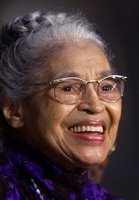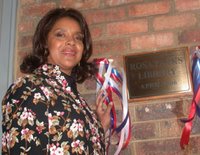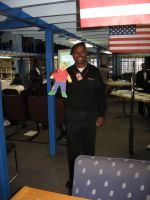

The national library association here is called Liasa – Library and Information Association of South Africa. (They seldom capitalize acronyms; drives me crazy.) There are regional branches, tied mostly (I think) to the various provinces. Because the population of Gauteng is so big, we have two branches here, Gauteng South and Gauteng North. In late November I attended branch meetings for each. In the meeting I attended, it seemed to me that Gauteng North has more white people, and they are largely Afrikaans speaking. The Gauteng South meeting seemed to be more of a mixture, and what’s more, because there are more blacks in that group, and because the blacks here speak a variety of languages, most everyone speaks in English. Well, all of the business and programs of the meetings are in English, but I’m talking about the networking chit-chat before and after. Furthermore, the Gauteng South group just seemed more warm and friendly, so I decided to affiliate with that group.
(Aside – I don’t think I’ve mentioned in any of these posts that “black” is the politically correct term to use here. Can’t very well call them African Africans! And you can’t say African or native, because the white people are also Africans and natives! Black, white, Asian and coloured (a person of any mix; black, white, Indian, etc.) are the terms used. Asian almost always refers to people from the Indian subcontinent of Asia. I’ve seen very few Chinese, Japanese, Korean or southeast Asians here.)
The GSB group was also in desperate need of a secretary to fill the unexpired term of someone who had left. I figured that jumping right in would be a good way to get involved and meet people, so I volunteered. I’m really glad I did. I’ve enjoyed getting to know the folks on the Executive Committee (Exco), and knowing a few friendly faces at the next Liasa conference (end of September) will make it more fun.
Anywho, Selaelo Ramoleta is on the Exco, and she is the director (I’m pretty sure) of the American Consulate libraries in Johannesburg. One of them is at the consulate in downtown Jo’burg, and the other is in Soweto. This year is the 30th anniversary of the Soweto library. To mark the anniversary, it was decided to rename the library after Rosa Parks. A big celebration was planned for April 19th, and Selaelo invited the Exco members to attend. I accepted the invitation gladly.
The American Library, as it was called until this past Wednesday, was originally established in the Orlando (an area within Soweto) YMCA. In the 1980s, it was moved to the Ipelegeng Community Center, in the Jabavu area of Soweto. For many years, it was one of the few libraries of any size in Soweto, and it was also one of the few places where Sowetans could get news from outside of South Africa.
Today, the library has collections on small business practices, HIV/AIDS, American society, politics, education and economics. The Book Club is active in promoting a “culture of reading”, and in improving the writing skills of its members. It’s an attractive, patron-friendly library, and I was impressed by the dedication and professionalism of its staff.
The ceremony itself was well-planned and interesting. We heard remarks from the usual dignitaries – some representatives from the U.S. Embassy in Pretoria, the Bishop of the Anglican Diocese of Matlosane who is the former director of the Ipelegeng Community Center -- readings from a couple of South African poets (Don Mattera and Maishe Maponya), and the keynote speech from Ms Phylicia Rashad. Then Ms Rashad unveiled the plaque in front of the library door that formally launched the Rosa Parks Library.
After the program, a buffet lunch was served in the hall where the program was, and in the library. I ate in the library, and was seated between the current director of the community center (also an Anglican priest), and a Methodist minister from a nearby church. Tim (the Anglican) and I had an interesting chat about race relations in all the various places he has studied and served (including NYC and Chicago). He said that during the apartheid years, he was treated as a hero in other countries, just because he was black. He was the first black priest at a church in Rosebank (a sort of swank part of Jo’burg), and it was sad to hear how some of the older white parishioners treated him initially. They would be friendly enough at church, but if he came to their homes, he would be asked to use the servants’ entrance, and hurried out if anyone else (white) came calling.
I think I’ve told some of you that I’m not necessarily seeking out Americans while I’m here – I know a lot of you at home! But I do occasionally miss an American accent, and I got my fill on Wednesday. It was a nice day, and I’m glad I went. I was happy to represent librarians, Americans, and Alabamians! And I felt very proud of myself for successfully navigating myself to and from the community center. I always feel more at home in a city when I know my way around. I’m getting there…
http://pretoria.usembassy.gov/wwwhnews060420.html



